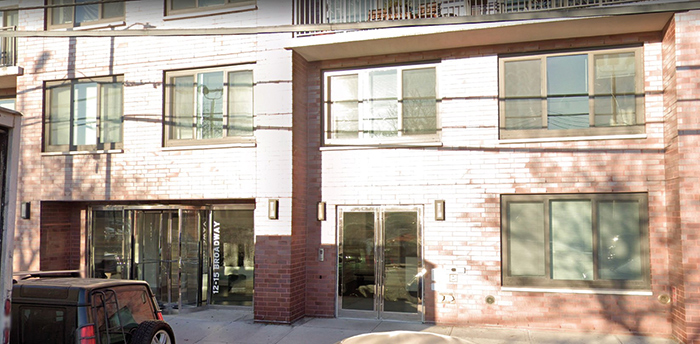Photo Courtesy of Google
12-15 Broadway in Astoria is among the three buildings in the lawsuit.
By Forum Staff
Housing Rights Initiative, a housing watchdog group, recently uncovered that landlords Joseph Brunner and Abe Mandel, along with David Lubinitsky, and Heatherwood have been abusing the 421a tax benefit program.
421a is a tax benefit program that landlords receive as-of-right for new construction of multi-family rental housing. As a condition of the benefit, most landlords are required to rent-stabilize 100 percent of their units.
As of January, the landlords, collectively, have received over $20 million in 421a tax credits across 427 units in three buildings, and illegally overcharged thousands of former and current tenants an estimated $10 million in rent. The buildings in the suit are 12-15 Broadway in Astoria with 214 units; 1875 Atlantic Avenue with 118 units, and 544 Union Avenue with 95 units (both of Brooklyn). HRI announces these class action lawsuits, which were filed by the law firm Newman Ferrara, LLP, in conjunction with the Housing Justice for All Coalition, State Sens. Jabari Brisport, Michael Gianaris, Brian Kavanagh, and Julia Salazar; Assemblymembers Emily Gallagher, Zohran Mamdani, and Linda Rosenthal; and City Councilmen Costa Constantinides and Stephen Levin.
Rent stabilization regulates the initial rent and subsequent rent increases of a rent-regulated unit. In a building receiving 421a, the initial registered rent of the first occupant of a unit must be equal to the average monthly rent paid by the tenant (also known as the net effective rent). Every subsequent rent increase should be based on that amount.
The landlords in question engaged in a systematic concession scheme to inflate the initial registered rents and maximize subsequent rent increases.
In these cases, HRI found that the landlords gave the tenants rent concessions, meaning that at least one month of rent was free. When calculating the average rent, the landlords purposefully did not take these concessions into account. In a non-rent stabilization context, this would be legal, but in a rent stabilization context, it is a back-door method to illegally raise rents.
By way of example: say an apartment’s market-rate rent was $2,000, and the landlord gave a one month rent concession to the first tenant. When calculating the average rent, the landlord should have taken into account the free month. In other words, they should have multiplied the $2,000 rent by 11 months, and divided it by 12 months in order to account for the $0 month. That would have made the initial stabilized rent $1,833.33. Instead, what this landlord did was multiply the $2,000 rent by 12 months, not taking into account the concession, making the initial stabilized rent $2,000—which is wrong. The landlord then took further increases off that inflated figure.
Tenants who have been overcharged are entitled to rent refunds, rent reductions, and properly rent-stabilized leases by law.
In 2018, New York City suspended the 421a tax benefits of 1,788 landlords for non-compliance. We are calling on the Division of Homes and Community Renewal to audit the 421a tax program for fraudulent activities and improprieties, starting with those identified by New York City.
“My district has seen far too many abuses of rent stabilized tenants,” Constantinides said. “Unscrupulous types like disgraced presidential son-in-law Jared Kushner keep trying to game the system to take advantage of already suffering Queens residents. I applaud Housing Rights Initiative for fighting to hold these landlords accountable and will pledge to ensure that government does the same.”

